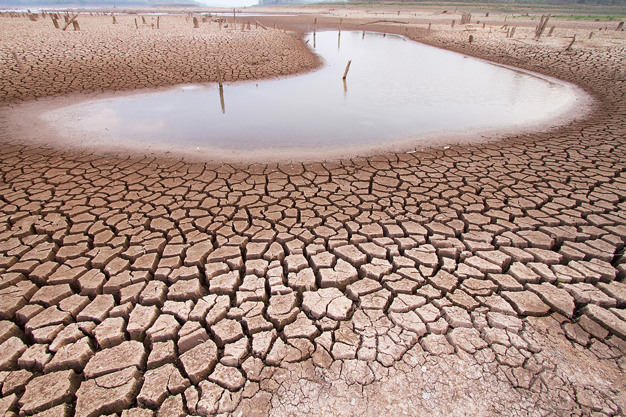Climate change has become a recurring theme in agricultural news, particularly in countries like Egypt. The country is located in North Africa, one of the most vulnerable regions in the world to climate change. A constant drought has plagued the region for many years, and the satellite images are impressive, showing vast areas covering millions of hectares losing their verdant character. Extreme weather events have become commonplace. The effects are first felt by professionals in the agricultural and agri-food sectors before being felt by consumers in the form of shortages, seasonal irregularities, and inconsistent quality.
Islam Farhat, professor at the National Research Center, and Mounir Haddad and Sherif Doss, agricultural investors who popularize ecologic solutions for an audience of and agribusiness professionals in Egypt, share this paper to summarize key information on this preoccupying situation.

Climate change in Egypt calls for good agricultural practices
By Prof. Dr. Islam Farhat, Mr. Mounir Haddad, and Mr. Sherif Doss
Climate change poses a significant threat to global agriculture, with Egypt being particularly vulnerable due to its arid environment.
Agriculture is a primary economic driver in Egypt, and any disruption in crop productivity can have serious consequences, including food insecurity and economic losses.
This article explores the impacts of climate change on Egypt's crops and discusses the importance of adopting good agricultural practices (GAP) to mitigate these effects and ensure sustainable food production.
Impacts of climate change on crops in Egypt
1. Heat Stress and Declining Yields
Rising temperatures are one of the most immediate consequences of climate change, and their effects on Egyptian crops are already visible.
High temperatures disrupt critical growth processes like photosynthesis and water uptake, leading to lower yields. Heat during flowering stage, result in reduced quality, poor pollination and reduced fruit development.
Higher temperatures also increase water demand for crops, putting additional pressure on Egypt's limited water resources.
2. Water scarcity and crop failure
Egypt's agriculture depends heavily on irrigation from the Nile River, which is threatened by climate change due to decreased rainfall and increased evaporation.
Water-intensive crops, have already been restricted in some areas due to the growing water scarcity. As water becomes scarcer, irrigation costs rise, making it difficult for farmers to maintain crop productivity.
Water-intensive crops like vegetables, such as tomatoes and potatoes, are at risk of reduced yields due to irregular water availability, leading to higher prices in local markets.
3. Pest and disease proliferation
Warmer temperatures create favorable conditions for the spread of pests and diseases. The fall armyworm, which has started spreading across Egypt, attacks many crops, leading to significant losses. Fungal diseases, such as downy mildew and rust, also thrive in warmer and wetter climates, threatening crops like grapes, and potatoes.
Pest migration patterns are shifting, making it harder for farmers to manage outbreaks, resulting in increased pesticide use and rising production costs.
4. Soil Degradation and Salinization
Soil degradation and salinization, particularly in coastal areas, are accelerated by climate change. Rising sea levels cause saltwater intrusion into the Nile Delta,
making soils less suitable for agriculture. Citrus and tomatoes are highly vulnerable to salinization, leading to nutrient deficiencies and stunted growth.
Over-exploitation of soils through intensive farming practices further contributes to long-term reductions in land productivity.

The Importance of Good Agricultural Practices (GAP)
1. Efficient water management
Improving irrigation efficiency is essential in Egypt, where water scarcity is a growing problem. GAP encourages techniques like drip irrigation, deficit irrigation, and precision agriculture to deliver water directly to the root zone, reducing waste. Soil moisture sensors and weather-based irrigation scheduling further help in optimizing water use and maintaining crop health with less water.
2. Soil health improvement
Maintaining soil fertility is crucial for sustainable agriculture. GAP promotes the use of organic amendments like compost and manure to improve soil structure and nutrient availability.
Crop rotation and conservation tillage can prevent soil degradation, enhance soil health, and ensure long-term agricultural productivity.
3. Integrated pest management (IPM)
Integrated pest management (IPM) focuses on monitoring pest populations and using a combination of biological, cultural, and mechanical control methods to manage pests.
By reducing reliance on chemical pesticides, IPM preserves beneficial insects and maintains soil and water quality, while keeping pest outbreaks under control.
4. Climate-resilient crop varieties
GAP also advocates for the adoption of climate-resilient crop varieties. These resilient varieties allow farmers to maintain productivity even under challenging environmental conditions, ensuring more stable food supplies despite the negative impacts of climate change.

The impacts of climate change on Egypt's agriculture are profound, but they are not insurmountable
By adopting good agricultural practices, Egyptian farmers can significantly mitigate the challenges posed by rising temperatures, water scarcity, pest proliferation, and soil degradation. Efficient water management, soil health improvement, integrated pest management, and the adoption of climate-resilient crop varieties are key strategies for safeguarding Egypt's agriculture.
As climate change continues to affect agricultural production, it is critical for both policymakers and farmers to invest in sustainable farming practices.
By embracing good agricultural practices, Egypt can protect its agricultural sector, ensure food security, and foster long-term resilience in the face of a changing climate.
For more information:
Islam Farhat
National Research Centre, Egypt
Email: [email protected]
Mounir Haddad
ADGA
Email: [email protected]
Sherif Doss
Email: [email protected]

